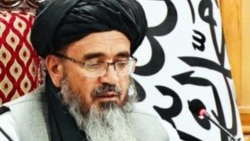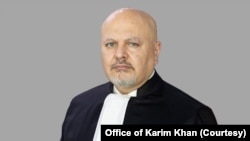ISLAMABAD —
Afghanistan’s ruling Taliban on Friday condemned the International Criminal Court’s request for arrest warrants against their supreme leader, Hibatullah Akhundzada, and his chief justice for alleged persecution of women and girls.
The Taliban’s Ministry of Foreign Affairs refuted the warrants as “devoid of just legal basis, duplicitous in nature and politically motivated.”
The strongly worded English-language statement follows Thursday’s announcement by the chief ICC prosecutor that he was seeking arrest warrants for the reclusive Akhundzada and Abdul Hakim Haqqani, who has been serving as the chief justice of the country since the Taliban seized power in 2021.
Prosecutor Karim Khan cited a thorough investigation and evidence collected in the process for concluding that the Taliban leaders “are criminally responsible for persecuting Afghan girls and women.”
Khan said that persecution has persisted since the Taliban regained control of Afghanistan after nearly two decades of insurgency against the internationally recognized Kabul government and U.S.-led Western forces.
“It is unfortunate that such baseless allegations are being leveled against the honorable leaders of the Islamic Emirate [Taliban government] at a time when Afghanistan enjoys nationwide peace, its people have breathed a sigh of relief … and numerous other miseries and inhumane activities have been eradicated,” the Taliban ministry asserted.
The Taliban takeover has almost ended years of war-related hostilities in the impoverished South Asian nation, leaving millions of Afghans in need of humanitarian assistance.
“Regrettably, this institution had turned a blind eye to the war crimes and crimes against humanity committed by foreign forces and their domestic allies during their twenty-year occupation of Afghanistan,” the Taliban statement claimed Friday.
Akhundzada has issued dozens of edicts over the past three years in line with his interpretation of Islamic law, or Sharia, from his base in the southern Afghan city of Kandahar. The decrees have instituted sweeping restrictions on women and girls that the United Nations has labeled as “gender apartheid.”
The Haqqani-led Taliban Supreme Court has implemented what it claims is a Sharia-based criminal justice system, leading to public floggings of hundreds of Afghan men and women in packed sports stadiums on allegations such as adultery, sodomy, eloping, and other crimes. Several Afghans also have been executed publicly under what the Taliban described as the Islamic concept of retributive justice, known as qisas.
Girls older than 12 are banned from pursuing education, including attending institutions that train midwives and nurses. Most women are prohibited from working in both the public and private sectors. They are blocked from visiting public parks, gyms, and baths.
The Taliban have mandated that females cover their faces in public and that they cannot travel long distances without a male guardian — making Afghanistan the only country in the world to impose such bans on women and girls. The de facto authorities have rejected persistent U.N.-led calls for reversing all restrictions on the female Afghan population.
“Our action signals that the status quo for women and girls in Afghanistan is not acceptable. Afghan survivors, in particular women and girls, deserve accountability before a court of law,” Khan said on Thursday.
Amnesty International on Friday described the ICC prosecutor’s application for arrest warrants against the two Taliban leaders as an “important step toward justice for Afghan women” and other vulnerable groups in the country.
“This is a crucial step to hold accountable all those allegedly responsible for the gender-based deprivation of fundamental rights to education, to free movement and free expression, to private and family life, to free assembly,” said Agnes Callamard, Amnesty’s secretary-general.
She also urged the ICC prosecutor to “reconsider his decision in 2021 to deprioritize investigations” into war crimes allegedly committed by former Afghan government security apparatus, the U.S. military, and allied troops during their 20-year presence in Afghanistan.
“This decision risks contributing to perceptions of a selective approach to international justice, which prioritizes the interests of powerful states and their allies over the right to justice of victims of crimes under international law,” Callamard said, referring to Thursday’s announcement by the ICC prosecutor.
The U.S.-led foreign forces withdrew from Afghanistan just days after Taliban insurgents swept back to power in Kabul.
This post was originally published on this site be sure to check out more of their content.










